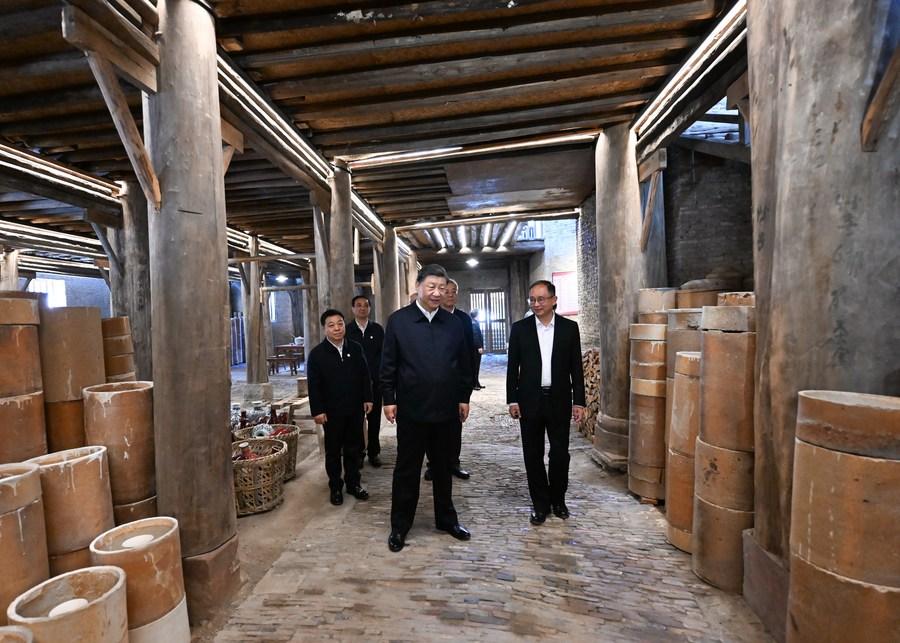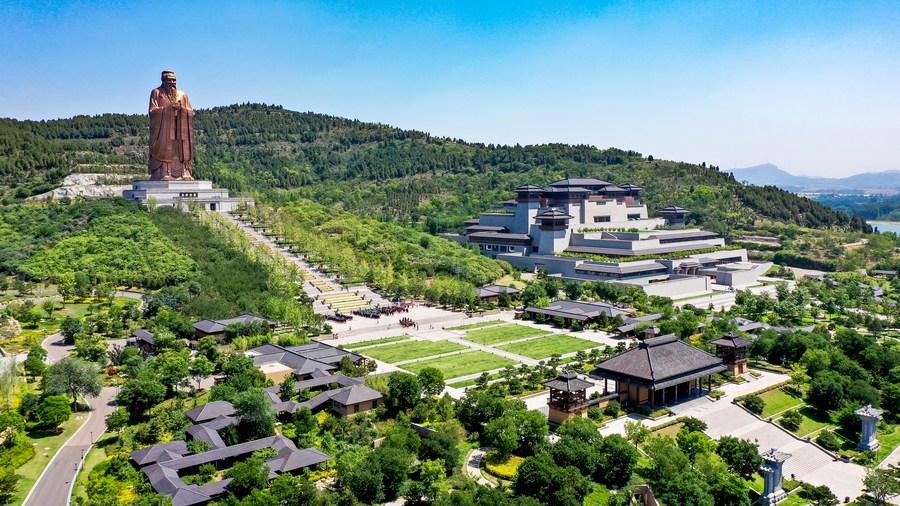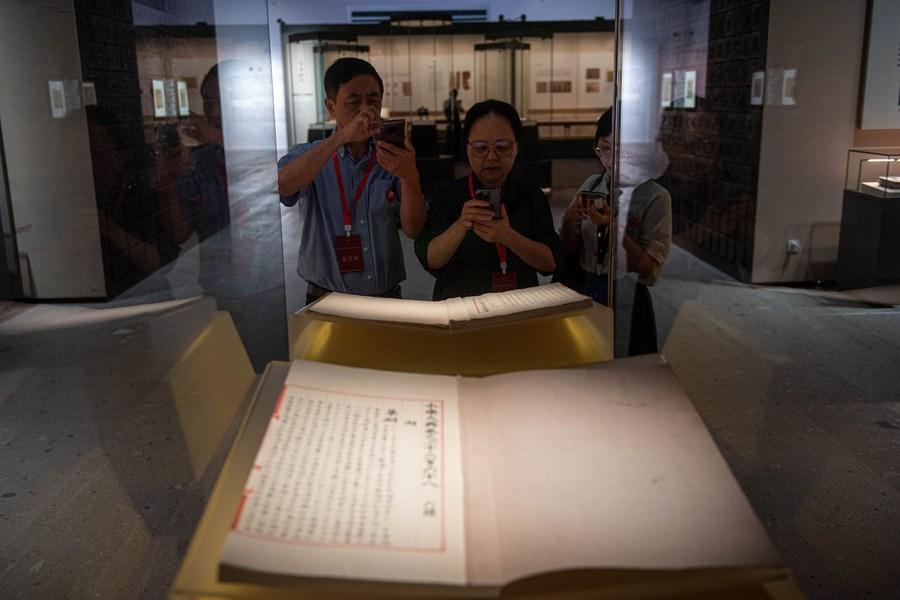
Xi Jinping, general secretary of the Communist Party of China Central Committee, visits a historical and cultural block in Jingdezhen City, east China's Jiangxi Province, Oct. 11, 2023. (Xinhua/Xie Huanchi)
In a move that observers call a new height in the cultural conviction of the Communist Party of China (CPC), a recent national meeting on public communication and culture has introduced a new concept: "Xi Jinping Thought on Culture."
Years before this significant event, Xi, who has served as the general secretary of the CPC Central Committee since November 2012, became the first leader in the Party's history to propose the idea of cultural confidence.
Xi Jinping Thought on Culture follows thoughts in five other spheres -- military, economy, ecological civilization, diplomacy, and the rule of law -- all significant components of Xi Jinping Thought on Socialism with Chinese Characteristics for a New Era. Taking note of the latest thought, keen observers have said that it may be the most essential and all-encompassing one to date.
Xi believes that without profound cultural confidence and a thriving culture, the great rejuvenation of the Chinese nation is unattainable.
His conviction is reflected in his support for significant cultural landmark projects, such as the China National Archives of Publications and Culture and the Chinese Academy of History, which he visited in June.
Speaking at a meeting on cultural inheritance and development following the visit, Xi called for efforts to build modern Chinese civilization.
The emphasis on culture by China's top leader this year has not gone unnoticed, generating attention from home and abroad. An ancient civilization is experiencing a renaissance through the integration of the fundamental tenets of Marxism with fine traditional Chinese culture, according to many voices.
A LEADER'S PASSION FOR CULTURE
Xi's profound interest in culture has significantly influenced his political as well as private life. Foreign media perceive him as not only possessing the demeanor of a national leader but also the distinctive cultural allure of the East.
He has often mentioned that while he enjoys a handful of hobbies, reading is his "greatest passion."
In his childhood, Xi was deeply touched by the story of Yue Fei, a Southern Song Dynasty (1127-1279) military commander. Yue took "Jing Zhong Bao Guo," or "serve the country with unreserved loyalty" as his motto and lived up to it. Xi has long remembered these four characters, calling them the pursuit of his entire life.
In the 1960s and 1970s, Xi spent seven years in Liangjiahe, Shaanxi Province, as an educated youth. During this period, he threw himself into studying classic Marxist works and literature -- both Chinese and foreign tomes. He read "Das Kapital" three times.
The impact of Xi's grounding in China's classic literature has had a profound influence on his political career.
For example, he once wrote a classical poem to commemorate Jiao Yulu, a county cadre known for his selfless devotion to the people. During his tenure as Zhejiang's provincial Party chief, Xi urged officials to enrich their knowledge of traditional culture. In Shaoxing, where China's best-known calligrapher Wang Xizhi lived in the 4th century, Xi suggested local cultural officials memorize Wang's masterpiece, "The Preface to the Poems Composed at the Orchid Pavilion."
After assuming the Party's top post, during a seminar on literature and art, Xi said that fine traditional Chinese culture forms a solid foundation for China to stand firm amid the tide of global cultural currents.

The aerial photo taken on June 8, 2023 shows the Nishan Sacredland in Qufu City, east China's Shandong Province. (Xinhua/Guo Xulei)
Xi's cultural literacy fosters a distinct connection with those close to him, and it's certainly not a manufactured public image as seen with certain Western politicians. His language style adeptly transitions between simplicity and classical eloquence, effortlessly articulating the governing principles of Chinese Communists and China's positions and viewpoints.
In the recently published first two volumes of "Selected Works of Xi Jinping," classical texts were referenced numerous times.
"What a joy to have friends coming from afar!" Foreign guests often hear this line in Xi's welcome speeches, the well-known line of "The Analects of Confucius." He often presents the bilingual editions of "The Art of War" and "The Analects of Confucius" as state gifts.
A decade ago, during his visit to Qufu, the birthplace of Confucius, Xi said he should take a closer look at two reference books about Confucian thoughts. Now the two books have been translated into 16 languages, including English, German and Korean, and distributed across the world.
"He is not only an 'advocate' of fine traditional Chinese culture but also an 'ambassador' for civilizational exchange and mutual learning," commented a netizen.
In Chinese tradition, personal refinement and a strong character are prerequisites for a qualified leader. Xi epitomizes such a tradition of cherishing rites and virtue.
He demands officials at all levels prioritize family values, often citing philosopher Mencius, who said that the root of the world is in the state, and the root of the state is in the family.
Photos of his family grace the bookshelves of Xi's office, and often, before attendees of events gather for group photos, he invites senior participants to sit in the front row.
He has also shared ancient stories of upright officials to remind Party members to be humble and cautious in exercising power.
Words like "lifeline," "fountainhead," and "foundation" are often used by Xi to describe the significance of fine traditional Chinese culture.
Xi's political career has taken him across China. Wherever he was sent, he would delve into local history and culture and visit cultural heritage sites to understand the state of cultural preservation in each locality.
In the early 1980s, when he worked as the Party chief of Zhengding County, Hebei Province, Xi first asked local authorities to identify and ensure the protection of two old locust trees and initiated a survey of local cultural heritages. Today, Zhengding, with a history of more than 1,600 years, stands as a renowned historical and cultural site in China.
Xi's commitment to cultural preservation continued even after becoming the country's top leader. He pushed for projects to facilitate better preservation of Chinese cultural classics like the "Revitalization Library" project and a comprehensive collection of Chinese traditional paintings.

Visitors take photos of exhibits at the Hangzhou branch of the National Archives of Publications and Culture in Hangzhou, east China's Zhejiang Province, July 30, 2022. (Xinhua/Jiang Han)
Xi emphasized "promoting the creative transformation and innovative development of fine traditional Chinese culture." This signifies that the inheritance and development of culture do not imply a simple return to tradition.
Xi has advocated for "bringing cultural relics to life." In present-day China, enthusiasm for cultural relics and traditions is on the rise, and digital technology is enriching the cultural experience of all Chinese.
The cultural vitality and creativity of the nation are booming. Between 2012 and 2022, the annual operating income of major cultural enterprises nationwide doubled, increasing from 5.6 trillion yuan to 12.2 trillion yuan (1.7 trillion U.S. dollars).
The core socialist values upheld by China are prosperity, democracy, civility, harmony, freedom, equality, justice, the rule of law, patriotism, dedication, integrity and friendship.
In a world where thoughts and cultures are constantly evolving, Xi has creatively integrated the essence of fine traditional culture into these values, presenting a more enriched essence than the "universal values" defined by some Western countries.
Xi has consistently prioritized the work of public communication.
He insists on following the guiding role of Marxism in the ideological field, emphasizing the importance of "the overall leadership of the Party." He calls on the news media to improve the capacity of dissemination, guidance and influence.
Xi himself set an example long ago. During his tenure in Zhejiang, he published over 200 short articles in a dedicated column on the front page of the Zhejiang Daily. With a tone to communicate on equal footing, he promptly addressed the concerns of the public.
Xi pays great attention to new developments and trends in culture. In a country with more than 1 billion internet users, he advocates for cyberspace governance to ensure the internet serves people's best interests.
"Cyberspace is a common spiritual garden for hundreds of millions of people," he said.
Xi introduced the great founding spirit of the Party, the great spirit in the fight against COVID-19, the great spirit of fighting poverty and the Silk Road spirit, among others.
He strongly condemned historical nihilism and led the efforts to promote the national spirit with patriotism as the core and the spirit of the times centering on reform and innovation to realize the Chinese Dream.
In the report to the 20th CPC National Congress, Xi proposed building cultural confidence and strength. This vision mirrors China's economic rise trajectory and is believed to bring about a confident nation with a strong cultural appeal.
Topics like "Why are the Chinese becoming more confident?" trend on social media platforms. "Why shouldn't they be confident? ... They have a history that goes back nearly 5,000 years. Their culture is rich, refined and elegant. Their dominance in science and technology is exemplary," answered a netizen from the United States.
An uninterrupted civilization of 5,000 years is thriving under Xi's leadership. While other nations seek to solve lingering problems, Xi shows the world his cultural vision and commitment.


